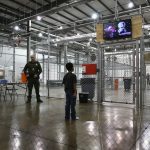Immigrants in detention facilities around the United States are often subjected to punitive and long-term solitary confinement and denied meaningful avenues of appeal, according to an investigation by PHR and Heartland Alliance’s National Immigrant Justice Center (NIJC).
Immigration detention is the fastest-growing incarceration system in the United States. While the system is not intended to be punitive, most immigration detention facilities are indistinguishable from jails: men and women are confined behind high walls lined with razor wire, and have little freedom of movement or direct contact with family.
Now, investigators have found that the detention centers and county jails that contract with US Immigration and Customs Enforcement (ICE) often relegate immigration detainees to punitive and long-term solitary confinement without meaningful avenues for appeal.
This report, the first of its kind, aims to examine the use of segregation and solitary confinement in the immigration detention system, share individual experiences, and provide concrete recommendations to eradicate the use of solitary confinement, a practice that has proven unnecessary, costly, and harmful to detainees’ physical and mental health.

